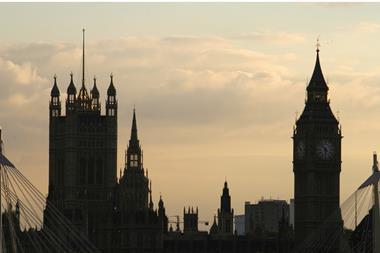Tata Steel is to pump £550m (€640.8m) into the British Steel Pension Scheme (BSPS) as part of a major restructuring agreed in principle with trustees and the UK regulator.
“Discussions are progressing constructively and we expect to be in a position to communicate the final outcome to members soon.”
Allan Johnston, chair of trustees
The deal will also see the pension fund take a 33% equity stake in Tata Steel UK.
The restructuring will take the form of a regulated apportionment arrangement (RAA), an option the BSPS trustee board has been advocating since Tata Steel first sought to cut its pension costs.
While far from finalised, the RAA signals a landmark moment for UK defined benefit pension schemes, given the high-profile nature of the case.
Both the Pensions Regulator (TPR) and the Pension Protection Fund (PPF) said the agreement met their published principles for allowing an RAA.
Crucially, this included the two organisations agreeing that Tata Steel UK was facing insolvency if its pension costs were not addressed.
However, the arrangement is still subject to a 28-day approval period as the regulator and the PPF analyse the details.
As part of the deal, and subject to approvals from TPR, Tata Steel UK will sponsor a new scheme, to be set up using assets from the existing BSPS. No details have been agreed, but BSPS’s trustee board said the new scheme would offer “modified benefits”.
BSPS members would be given the option of moving to the new scheme, or remaining with the original scheme, which will transfer to the PPF.
This new scheme is subject to qualifying conditions set by TPR. If these are not met, the full £15bn scheme would transfer to the PPF. Allan Johnston, chair of trustees, maintained that “most” members would be better off in the new arrangement.
“Pension restructurings which involve an RAA are rare, and we will only approve an RAA where stringent tests are met.”
Lesley Titcomb, chief executive, TPR
Lesley Titcomb, TPR chief executive, emphasised that there were still “important details to be finalised” before giving the RAA the green light.
In a statement, Titcomb said: “Good progress is being made in our discussions with Tata Steel UK and the trustees about the future of the British Steel Pension Scheme.
“Pension restructurings which involve an RAA are rare, and we will only approve an RAA where stringent tests are met, so that they are not abused by employers seeking to inappropriately offload their pension liabilities.
“We also continue to work with Tata Steel UK and the trustee in respect of the proposal to offer members an option to transfer to a new scheme sponsored by Tata Steel UK, which may occur should the approval to the RAA be granted, or stay in the BSPS and receive PPF compensation. The successor scheme would be subject to qualifying conditions.”
Johnston said in a statement on the British Steel scheme’s website: “Although the PPF is an important safeguard for pension schemes generally, the trustee [board] believes that the BSPS has sufficient assets to offer members the potential for better outcomes by enabling them to transfer to another scheme offering modified benefits.
“For most scheme members, these modified benefits are expected to be of greater value than those they would otherwise receive by transferring into the PPF.
“Tata Steel UK’s willingness in principle to sponsor a new scheme post-RAA, subject to conditions agreed with the BSPS trustees, paves the way to allowing members to make a choice based on their personal circumstances. Discussions are progressing constructively and we expect to be in a position to communicate the final outcome to members soon.”
Pensioner members transferring to the PPF would receive benefits in full, but annual increases are capped at 2.5%. Members yet to retire receive 90% of their annual pension income, capped at £34,655.05 a year.
A spokesperson for the PPF said: “Members of the scheme can be reassured that we are there to protect them throughout this process and they will be able to receive at least PPF levels of compensation, should they remain in the scheme and BSPS enter the PPF assessment period.”







